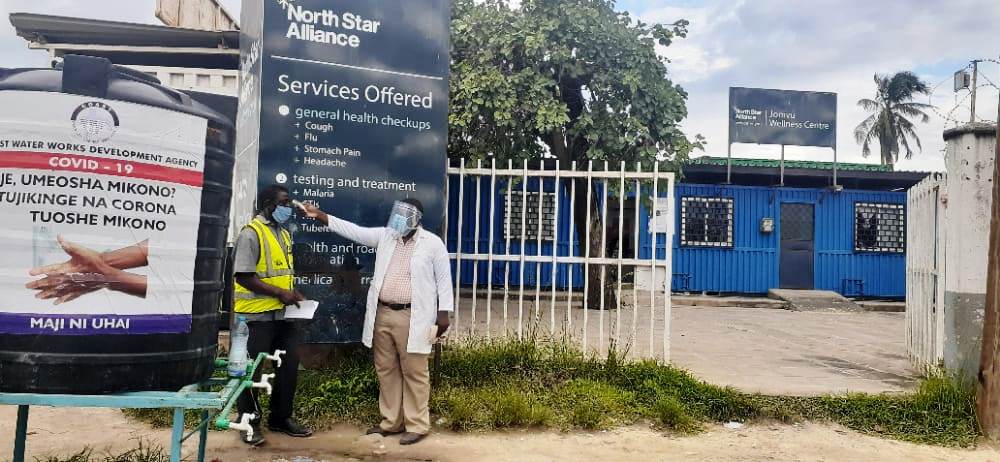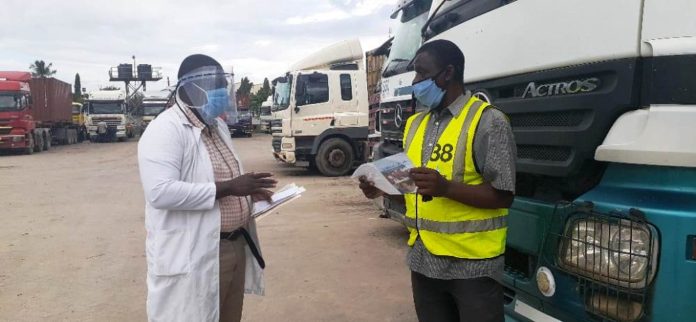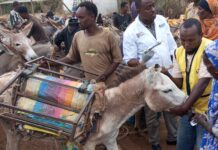By Lilian Museka
Nairobi, Kenya: As the East African Community continues to grapple with the rising cases of COVID19, it is emerging that long-distance truck drivers might be posing danger in spreading the virus
The drivers who simultaneously facilitate the transport of goods between member states, amid the ongoing pandemic, have since been classified under essential services in the region in line with Covid-19 Administrative Guidelines.
But while the region acknowledges the risk truck drivers might pose in spreading the virus as they transport essential goods across the region, the truth is that the nature of their job hardly allows them to get information on the virus.
“Some of them leave their destinations when they are negative but due to lack of information on the pandemic, coupled with frequent interactions with road sellers and eatery places or even touching their nose and mouth or eyes after contacting surfaces touched by a person with COVID19, by the time they arrive, they will have contracted and that’s why we came up with the “Blue Box” idea to help in sensitizing them about the virus and other emergencies,” says Eva Mwai” Regional Director, East Africa at North Star Alliance.

North Star Alliance is an organization that creates a network of semi-mobile “Blue Box” facilities from shipping containers repurposed as health clinics situated along major transport routes in sub-Saharan Africa countries serving highly mobile hard to track populations.
“Our Blue Boxes are strategically located at ‘hotspots’ such as border crossings, transit towns, and ports where large numbers of trucks stop to load and offload, and where sex work and informal trades flourish. Each Blue Box has flexible opening hours tailored to meet the needs of local clients, which often stretch late into the evenings,” she says.
The drivers spend many hours alone in the truck and face many challenges. However, they face potential risks of exposure to the virus when they come in to close contact with the attendants at stopover places, store workers, dock workers, or even other truck drivers they meet on the way due to lack of awareness.
John Gichamba, a Kenyan trucker working for Yalfa Cargo transport which transports containers and loose cargo from Mombasa port to Uganda admits that they face a lot of challenges. “We waste a lot of time at the testing facilities at border points because we have to wait for a long time to get results. We have also faced harassment from both police and local communities yet we have no one to sensitize us.”
Another trucker who did not want to be named but works for Sturt Company Limited transporting salt and other loose cargo says they face discrimination in restaurants, parking bays for truckers and are not allowed to stop anywhere on the roadside as residents term them ‘Corona carriers’
The trucker says they have been able to get assistance from North Star Alliance which include sensitization on COVID19 prevention, provision of sanitizers, face masks and soap, HIV testing and counseling, other health services including treatment for other diseases, sanitizers, face masks and soap from the blue box Wellness centers.
“Truck drivers are not respected by some people. They do great. They do great work which many don’t appreciate. People forget that besides being the truckers we see, they are above all and importantly people’s husbands, fathers, uncles, etc.
It is unfortunate that the population at these high-risk places is hardly sensitized on preventive measures thereby leaving them exposed to such pandemics as COVID19.
Due to this emerging pandemic, some of North Star staff, MoH front liners, and some local leaders were supported by the ministry of health in Kenya to undergo a training of trainers (ToT) program, who in turn mobilized other staff and peer educators and trained them, forming the outreach workers that are now sensitizing the truckers at the blue boxes.
“So far, we have trained 68 TOTs and 124 outreach workers (mainly peer educators). We have trained in Mlolongo, Naivasha, Maai Mahiu, Gilgil Mombasa, and Malaba. We provide information on COVID19 to the truckers, which include preventive measures, symptoms, and first responders. Additionally, we screen all patients (including truckers) who visit our clinics. Scania donated masks, sanitizers, and soap to for truckers and we have dispatched them to our clinics and truck parks to be distributed to the drivers,” adds Eva.

After the training by MoH, the sensitization program which started early in May has so far seen a total of 1,652 people sensitized. At the same time, screening for temperature with infrared thermometers started in March 2020 and so far, up to 13,000 people – 50% of who are truckers and the rest sex workers and roadside community members have been screened with suspected cases being referred to MoH.
The most challenging part is that cases of more drivers turning positive are increasingly causing friction among the members’ states with other leaders proposing for borders to be closed while others returning drivers who turn positive to their countries of origin.
This has resulted in slower trade among the neighbors and this may lead to a rise in the cost of commodities to the end-user and reduced cross border business which small size businesses are dependent on.
The region heavily relies on the freight transport industry to keep supply chains functioning. Currently, very few cargo flights are in operation which in essence increases reliance on road transport
“It is important that all stakeholders come together and play a key role in minimizing COVID19 transmission within high-risk demographics, supporting infection prevention and control and health education,” adds Eva.
North Star Alliance is currently doing this via the Blue Box facilities, while its cross-border electronic health records system helps in monitoring the health of frequent high-risk travelers.
The regional director also called on truck drivers’ employers to encourage continuous testing of their employees, encourage sick drivers to stay at home and those diagnosed with COVID19 should remain in isolation until cleared by healthcare providers.
She also adds that employers must provide drivers with all PPE (including vests, safety glasses, hard hats) that they might need while on the road to avoid borrowing from others, provide alcohol-based hand sanitizers containing at least 70 alcohol for truck cabs and also tissues and small trash cans for truck cabs.
Eva is of the opinion that the current friction among the regional countries can easily be addressed if all members’ states agreed to sensitize the truckers from the destination of origin. “If left unattended the impact could pose a big challenge in the supply chain as essential goods will not be able to get from one place to another.
The organization also has interventions in healthcare for people living with HIV and other diseases and is funded by such partners as Aidsfonds, Trafigura Foundation, AMREF, and principal recipients of CDC and USAID funds such as FHI360 and Impact Research and Development Organization (IRDO) among others. Grand Challenges Canada partners in the Sexual Reproductive Health and Rights (SRHR) interventions.














